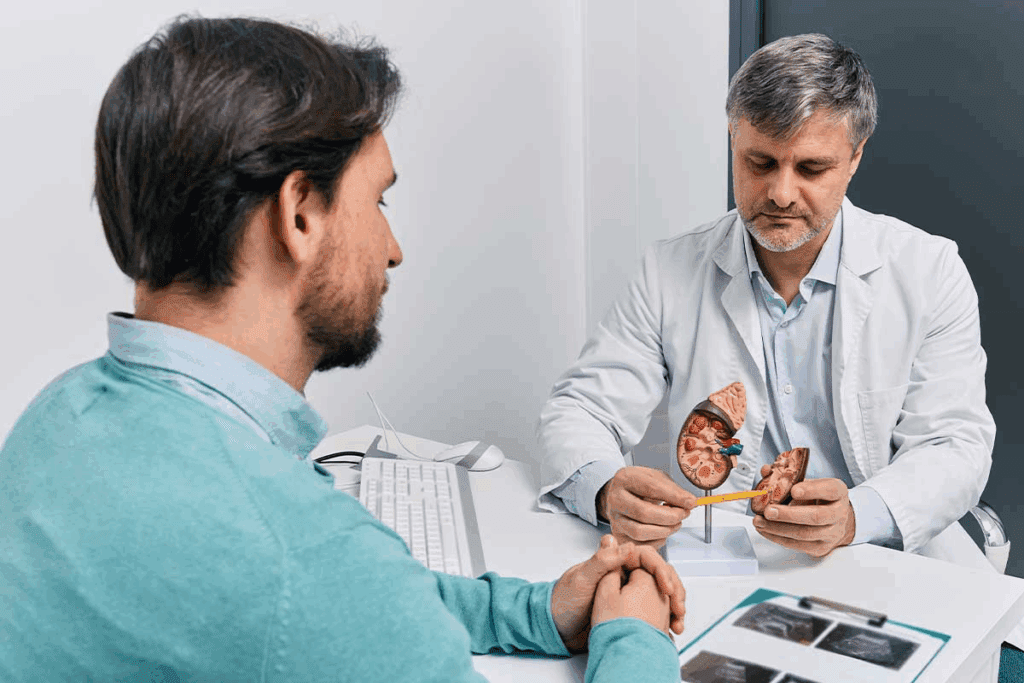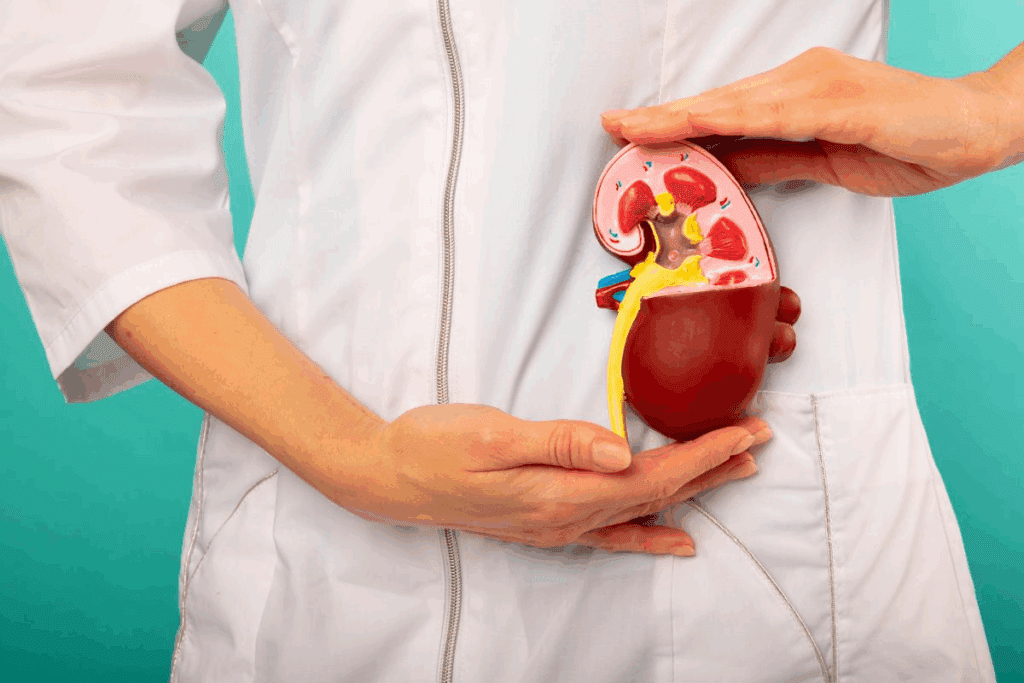
Many of us have felt the pain of a urinary tract infection (UTI) and wondered if it will heal by itself. We often ask ourselves if we need to see a doctor or if the infection will just disappear.What happens if you have an untreated urinary tract infection? Learn the risks of the infection spreading to the kidneys and bloodstream.
Studies show that while some mild UTIs might clear up without help, most need medical care to avoid serious problems. Ignoring a UTI can lead to kidney infections and long-term damage.

It’s important to know about Urinary Tract Infections (UTIs) and how they affect our health. UTIs happen when bacteria get into the urinary tract. This includes the kidneys, bladder, and the tubes that connect them.
Most UTIs are caused by bacteria, with Escherichia coli (E. coli) being the main offender. These bacteria can get into the urinary tract through the urethra. If they’re not washed out, they can multiply and cause an infection.
Several things can make you more likely to get a UTI. These include:
The symptoms of UTIs can differ based on the infection’s severity and location. Common signs include:
Spotting these symptoms early is key to getting medical help quickly.
UTIs are categorized by the part of the urinary tract they affect:
| Type of UTI | Affected Area | Severity |
| Lower UTI (Cystitis) | Bladder | Mild to Moderate |
| Upper UTI (Pyelonephritis) | Kidneys | Severe |
| Urethritis | Urethra | Mild |
Knowing the type and severity of a UTI is key to choosing the right treatment.

Urinary tract infections (UTIs) are a big health issue worldwide. They affect millions of people every year. The impact is huge, both in terms of people affected and the cost to healthcare systems.
UTIs are among the most common bacterial infections globally. Studies show that UTIs make up a big part of all infections. They are common in both community and hospital settings.
Research says there are hundreds of millions of UTI cases worldwide each year. This makes UTIs a big public health problem. We need to spread awareness and take steps to prevent them.
The chance of getting a UTI changes a lot between different groups. Women are more likely to get UTIs. Studies say up to 50% or more of women will get a UTI at some point.
Men get UTIs less often, mostly in younger years. But, age, health issues, and urinary problems can raise a man’s risk of getting a UTI.
Many things can make someone more likely to get a UTI. Being a woman is a big risk factor. Women’s shorter urethras make it easier for bacteria to get to the bladder.
Some UTIs can clear up on their own, leading to more research. We’ll look into how often this happens and what makes it possible.
Studies show that about 27% of UTIs can clear up without antibiotics. This happens in about three days.
This shows our bodies can fight off some infections. But, it’s important to remember not all UTIs will go away on their own. And, there’s always a risk of serious problems.
There’s a big difference in how fast UTIs clear up with or without antibiotics. Without treatment, 27% clear up in three days. But, with antibiotics, that number jumps to 54%.
| Treatment Status | Resolution Rate within 3 Days |
| Untreated | 27% |
| Treated with Antibiotics | 54% |
This shows antibiotics really help in getting rid of UTIs faster.
Several things can affect if a UTI will clear up on its own. These include how bad the infection is, your overall health, and how well your immune system works.
Knowing these factors is key to figuring out the best way to handle a UTI.
Without treatment, UTI symptoms can last from a few days to weeks. The exact time depends on the infection’s severity and the person’s health.
UTI symptoms without treatment go through several stages. They start mild but can get worse if not treated.
The UTI progression varies among people. The bacteria type, immune response, and treatment impact the timeline.
Several factors can affect how long a UTI lasts without treatment. These include:
Knowing these factors can help manage UTI symptoms and decide when to see a doctor.
Untreated urinary tract infections can cause serious health problems. If not treated, the infection can spread and harm the kidneys. This can affect your overall health.
Untreated UTIs can turn into upper urinary tract infections, like pyelonephritis. This happens when the infection moves up to the kidneys. It can cause severe pain, fever, and other symptoms.
If not treated quickly, pyelonephritis can damage the kidneys permanently.
The kidneys are at high risk from untreated UTIs. An infection in the kidneys can cause scarring. This can lead to chronic kidney disease or kidney failure in severe cases.
The risk is higher for people with pre-existing kidney issues or other health problems.
In severe cases, untreated UTIs can cause sepsis. Sepsis is a life-threatening condition where the infection spreads through the blood. It can cause fever, rapid heart rate, and confusion.
If not treated right away, sepsis can lead to organ failure and death. Seek medical help immediately if you think you have sepsis.
Untreated UTIs can have long-term effects on kidney function. Repeated or severe infections can lead to chronic kidney disease. This may require ongoing management, like dialysis or a kidney transplant.
It’s important to treat UTIs quickly and manage any underlying conditions. This helps prevent long-term kidney damage.
UTIs show up differently in various groups, like women, pregnant women, the elderly, and kids. Knowing these differences helps doctors diagnose and treat UTIs better.
Women get UTIs more often than men because of their anatomy. Their shorter urethra lets bacteria reach the bladder easier. A study in the Journal of Clinical Microbiology found women often get UTIs again, affecting their life quality.
“Sex, certain birth control, and menopause changes raise UTI risks in women,” a urology researcher said.
Pregnancy ups UTI risk due to body changes. The growing uterus can press on the bladder and ureters, causing infections. If left untreated, UTIs in pregnancy can lead to serious issues like preterm labor and kidney infections.
A medical expert emphasized, “Quick treatment of UTIs in pregnant women is key to avoid serious problems and ensure a healthy baby.”
Older people, with or without health issues, face a higher risk of complicated UTIs. These infections are harder to diagnose and treat because of age-related issues, like cognitive problems and antibiotic resistance.
UTIs in kids can be tricky to spot because they often show up as fever, fussiness, or not wanting to eat. Quick diagnosis and treatment are key to avoid kidney damage. Kids with vesicoureteral reflux are at higher risk for UTIs.
A pediatric urologist stressed, “Spotting and treating UTIs in kids early is critical to stop future problems and help their kidneys grow right.”
Knowing when to see a doctor for a UTI is key to managing it well. Some UTIs might get better on their own. But, some need quick medical help.
Severe symptoms like intense pain in your lower abdomen or back need quick doctor visits. Also, if you have a fever over 101.5°F (38.6°C) or vomit a lot, get help fast. Seeing blood in your urine or having trouble peeing is another sign to see a doctor right away.
Spotting these warning signs early is very important. It can help stop the infection from getting worse.
Some people are more likely to face serious problems from UTIs. They should always see a doctor. This includes pregnant women, people with diabetes, and those with weak immune systems.
Following your UTI treatment plan is very important. It helps clear the infection and stops antibiotic resistance. About one-third of women don’t finish their antibiotics as told.
It’s essential to finish all antibiotics as directed to treat UTIs well and avoid them coming back.
Not finishing your treatment can cause the infection to come back. It can also make future infections harder to treat. This is because it leads to antibiotic resistance.
Knowing how important it is to finish your treatment can help you take it more seriously. This can improve your health outcomes.
Adding natural remedies and self-care to your routine can help manage UTIs. These steps can improve your overall health. While medical treatment is key, these approaches can aid in recovery and prevent future infections.
Hydration is key in fighting UTIs. Drinking lots of water helps clear bacteria from your urinary tract. This can lessen symptoms and stop infections from happening again. Aim to drink at least eight glasses of water daily.
Making dietary changes can ease UTI symptoms and boost urinary health. Eating foods high in antioxidants, like berries and leafy greens, can fight inflammation. Also, probiotics in yogurt and fermented foods support your urinary tract’s health.
Over-the-counter (OTC) products can ease UTI symptoms. Cranberry supplements and urinary tract analgesics like phenazopyridine can help with discomfort. Always talk to a healthcare provider before trying new supplements to make sure they’re safe.
Besides traditional medical treatment, complementary therapies like acupuncture and herbal remedies might offer extra relief. Some herbal extracts, like uva ursi, might have antimicrobial properties good for UTIs. But, their effectiveness can differ, so always check with a healthcare provider.
Urinary tract infections (UTIs) are a common health issue that can significantly impact quality of life. Understanding the causes, symptoms, and complications of UTIs is key for effective management. We’ve discussed the importance of recognizing when medical treatment is necessary and the benefits of self-care approaches.
A summary of UTI treatment shows the need for prompt medical attention, mainly for high-risk groups like pregnant women and those with underlying health conditions. UTI management goes beyond medical treatment. It also includes lifestyle changes and natural remedies to prevent recurrence and promote urinary health.
By understanding the risks of untreated UTIs and the benefits of proper care, individuals can take proactive steps. This helps manage their condition and prevent long-term complications. We stress the importance of seeking medical treatment when needed and adopting a holistic approach to UTI management.
Some UTIs might clear up by themselves. But, it’s not always the case and can lead to serious issues. It’s best to see a doctor to avoid risks.
The time a UTI lasts without treatment varies. It can be a few days to weeks, depending on the person.
Not treating a UTI can cause serious problems. It might lead to kidney damage, sepsis, and other serious issues.
Some bladder infections might clear up by themselves. But, it’s important to see a doctor to avoid complications and get the right treatment.
Drinking lots of water and changing your diet might help. But, antibiotics are usually needed to fully treat a UTI. It’s best to talk to a doctor for the right treatment.
How long a UTI lasts depends on many things. It can last longer if not treated.
Severe symptoms like intense pain, fever, or vomiting need quick medical help. Pregnant women and the elderly should also seek treatment right away.
Eating certain foods and drinking more water might help prevent UTIs. But, it’s not a sure way to avoid getting one.
Over-the-counter products like pain relievers can help with symptoms. But, antibiotics need a doctor’s prescription.
Some UTIs might go away by themselves. But, there’s a chance of complications. Seeing a doctor can help prevent these risks and ensure proper treatment.
Subscribe to our e-newsletter to stay informed about the latest innovations in the world of health and exclusive offers!
WhatsApp us